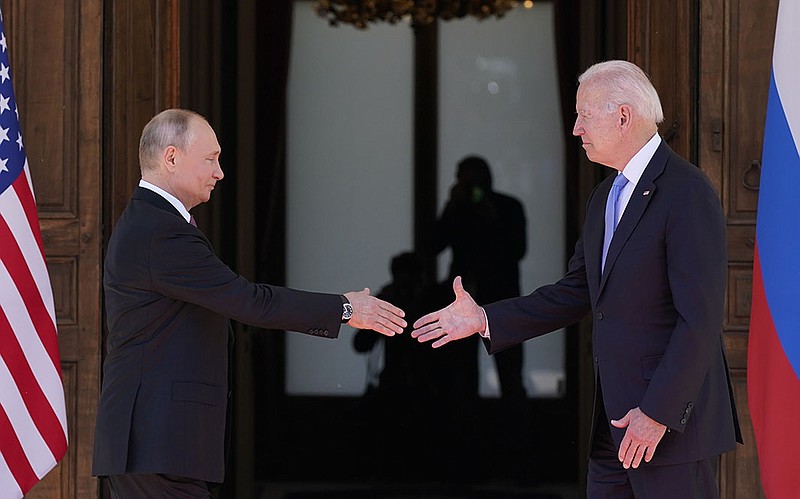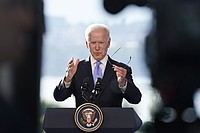GENEVA -- President Joe Biden and Russian President Vladimir Putin concluded their summit Wednesday with an agreement to return their nations' ambassadors to their posts in Washington and Moscow, and to work toward replacing a treaty between the two countries limiting nuclear weapons.
The meetings, spanning only a few hours were too short to allow for much more than an accounting of both sides' complaints. Biden and Putin declared the event a success, mostly for them having met at all at a time when relations between the world's two greatest nuclear powers are at a post-Cold War low.
"I did what I came to do," Biden told reporters after the sessions, as he sought to claim the moral high ground and further an argument about the superiority of democratic values that he has made throughout his first foreign trip as president.
"I also told him that no president of the United States could keep faith with the American people if they did not speak out to defend our democratic values, to stand up for the universal and fundamental freedoms that all men and women have, in our view," Biden said.
The two leaders offered starkly different views on difficult simmering issues, including cyber and ransomware attacks originating from Russia.
[Video not showing up above? Click here to watch » https://www.youtube.com/watch?v=yCDu2-oU2CE]
Putin insisted anew that his country has nothing to do with such attacks, despite U.S. intelligence that indicates otherwise. Biden, meanwhile, said he made clear to Putin that if Russia crossed certain red lines -- including going after major American infrastructure -- his administration would respond, and "the consequences of that would be devastating."
Both leaders, who have stirred escalating tension since Biden took office in January, suggested that while a large chasm between the two nations remains the talks were constructive.
Putin said there was "no hostility" during three hours of talks, a session that wrapped up more quickly than expected.
Putin also said he and Biden agreed to begin negotiations on nuclear talks to potentially replace the New START treaty limiting nuclear weapons after it expires in 2026.
Washington broke off talks with Moscow in 2014 in response to Russia's annexation of Ukraine's Crimea and its military intervention in support of separatists in eastern Ukraine. Talks resumed in 2017 but gained little traction and failed to produce an agreement on extending the New START treaty during the Trump administration.
The leaders issued a joint statement promising to hold arms-control talks and pledging that "a nuclear war cannot be won and must never be fought." It was a statement that reached back 36 years, to a meeting between Ronald Reagan and Mikhail Gorbachev, in 1985, also in Geneva.
When it was over, Putin had first crack at describing the results at a solo news conference, with Biden following soon after. Biden said they spent a "great deal of time" discussing cybersecurity and he believed Putin understood the U.S. position.
Biden said he raised with Putin the case of Russian dissident Alexei Navalny, as well as two "wrongly imprisoned" Americans held in Russia.
"The bottom line is I told President Putin that we need to have some basic rules of the road that we can all abide by," Biden told reporters after his first face-to-face meeting as president with Putin, which Biden said had a "positive" tone.
Biden spoke after Putin had framed the three hours of face-to-face talks as a victory for Russia on the world stage and said he can work with Biden in the future.
"On the whole we spoke the same language," Putin said. "And that doesn't mean we have to look into each other's eyes."
Putin called the talks productive. At his own post-summit news conference, he said he and Biden agreed to return their ambassadors to their respective posts in Washington and Moscow.
Russian Ambassador Anatoly Antonov and U.S. Ambassador John Sullivan have been away from their missions for months, imperiling diplomacy at time of heightened diplomatic tensions. Sullivan is expected to return to Moscow next week, said a senior U.S. official. Antonov is presumed to return around the same time.
[Gallery not loading above? Click here for more photos » arkansasonline.com/617potus/]
"If you ask me what sort of a partner ... Biden is, I'd say he is very constructive," Putin said at his news conference, which at roughly one hour lasted about twice as long as Biden's.
"He's very balanced -- just the way that I expected," Putin said. "He's very experienced. You can tell that at first glance."
Putin added that the two men did not exchange invitations for either to visit in Moscow or Washington.
"President Biden did not invite me as his guest," he said. "I didn't invite him either. I think for visits like that, for meetings like that, you need to have the proper conditions. You need to be ready."
Biden went to the summit fortified by nearly a week of chummy diplomacy with U.S. allies in Europe, a signal to Putin that the transatlantic rifts created by former President Donald Trump and exploited by Putin are firmly in the past. He also arrived with more than four decades of foreign policy experience and previous experience negotiating with Putin, whom earlier in the week he called "bright," "tough," and "a worthy adversary."
'OUT OF BOUNDS'
During the discussion, U.S. officials also submitted a list to Russian counterparts containing 16 U.S. sectors that Washington believes should be "out of bounds" and "off limits" when it comes to destructive cyberwarfare attacks.
The list includes the food and agriculture sector, financial services, communications, defense industrial base and other industries. "This was given as a list to President Putin," said a U.S. official familiar with the matter, who spoke on condition of anonymity to discuss sensitive matters.
Biden said the two agreed to task experts in both countries "to work on specific understandings of what's off limits and to follow up on specific cases" in each country.
Asked what he would do if Russia violated the norm to forgo attacking critical infrastructure, Biden said, "I pointed out to him we have significant cyber capabilities... . He doesn't know exactly what it is, but he knows it's significant. If in fact they violate these basic norms, we will respond ... he knows, in a cyber way."
U.S. policy has long been to preserve flexibility in responding to foreign aggression, including in cyberspace. The United States, officials often say, reserves the right to respond in a manner, time and place of its choosing -- and that cyberattacks need not be responded to in kind. In fact, former officials say, cyber alone is often not the most effective measure.
In addition to hacks, including the SolarWinds intrusion into U.S. government agencies and businesses, the U.S. agenda included criminal cyberattacks, such as one on a central gas pipeline in the United States this year.
DETAILED MEETING
Biden, during his news conference, downplayed the shorter length of the summit than White House aides had forecast, saying he and Putin had talked about a range of issues in "excruciating detail."
"Part of the reason it didn't go longer is when is the last time two heads of state have spent over two hours in direct conversation across the table going into excruciating detail," Biden said. Aides had predicted that the meeting would last four or five hours.
Biden said the success of the meeting should be judged by whether there is adequate follow-up on the initiatives to which the two leaders agreed.
The session began with a mix of cordiality and chaos, as the two presidents shook hands and then watched as Russian and American journalists jostled and shouted during what was supposed to be a sedate opening photo.
"Mr. President, I would like to thank you for the initiative to meet today," Putin told Biden through an interpreter, as the two sat inside an ornate library.
"The U.S. and Russian relations have a lot of issues accumulated at the highest level," he added. "And I hope that the meeting will be productive."
"As I said outside, it's always better to meet face to face," Biden responded.
Biden said he hoped the two countries can cooperate where they have mutual interests and find a path forward on issues on which they disagree.
"Two great powers," Biden said in conclusion.
The choice of words was notable. While Russia possesses the world's second-largest nuclear arsenal, its global influence has diminished greatly since the fall of the Soviet Union. In 2014, then-President Barack Obama dismissed Russia as a "regional power" in response to its annexation of Crimea, and Biden's description Wednesday seemed to elevate Russia, despite the country's repeated flouting of Democratic norms.
NAVALNY CONSEQUENCES
Biden's focus on Navalny posed a contrast with Trump, who largely dismissed accusations of Russian human-rights violations.
If Navalny dies in prison, "the consequences of that would be devastating for Russia" and hurt Putin's credibility in the eyes of the world, Biden said.
Putin dismissed questions about Russia's treatment of Navalny and instead referred to discord in the United States, specifically the Black Lives Matter movement and the Jan. 6 attack on the U.S. Capitol.
"America just recently had very severe events after well-known events, after a killing of an African American, and an entire movement developed known as Black Lives Matter," Putin said. "What we saw was disorder, destruction, violations of the law, etcetera. We feel sympathy for the United States of America, but we don't want that to happen on our territory, and we're doing our utmost in order to not allow it to happen."
Biden made a show of laughing at those comments when asked about them, calling them "a ridiculous comparison."
During a trip to Siberia in August, Navalny was poisoned with a nerve agent. He and Western intelligence agencies said the toxic attack was an attempt on his life ordered by Putin. Navalny returned to Russia after a five-month recovery in Germany and was arrested at the airport. The 45-year-old is now serving a more than two-year sentence in a penal colony outside of Moscow for alleged parole violations -- charges Navalny and international observers have said were fabricated to silence him.
Biden and his aides said ahead of the meeting that he hoped for a more stable and predictable relationship with Russia, and to set some guardrails for Putin.
"I'm going to make clear to President Putin that there are areas where we can cooperate, if he chooses. And if he chooses not to cooperate and acts in a way that he has in the past, relative to cybersecurity and some other activities, then we will respond. We will respond in kind," Biden said Monday after meetings of the NATO alliance in Brussels.
Answering questions Wednesday in Geneva, Biden touted his efforts earlier in the trip to rally "fellow democracies to make concerted commitments to take on the biggest challenges our world faces," and said that while "there's much more work ahead," he was pleased with the outcome of his summit with Putin.
"We've gotten a lot of business done on this trip," Biden said.
Information for this article was contributed by Anne Gearan, Ashley Parker, John Hudson, Isabelle Khurshudyan and John Wagner of The Washington Post; by Jonathan Lemire, Vladimir Isachenkov, Aamer Madhani, Zeke Miller and Daniel Kozin of The Associated Press; and by David E. Sanger, Michael D. Shear and Anton Troianovski of The New York Times.



